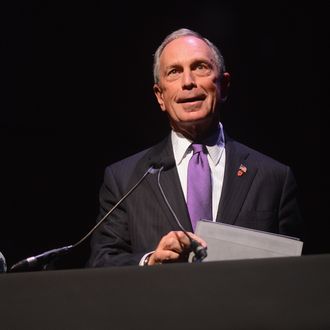
Mayor Michael Bloomberg is very, very rich. New York City is home to many very poor people. Neither fact is news, of course, but sometimes the juxtaposition comes into especially sharp relief — and provides a preview of a major issue in next year’s battle to succeed Bloomberg. Forbes, in its new list of the nation’s wealthiest, estimates that Bloomberg added $5.5 billion to his bankroll last year, swelling his net worth to $25 billion (sadly, that’s only good enough to make the mayor the second-richest New Yorker, behind David Koch). Coincidentally, the Census Bureau’s new numbers show a 1 percent increase in the number of New Yorkers living below the poverty line; more than one in five city residents are officially poor, according to the feds — a figure higher than the national average of 15.9 percent and about double the percentage in both New Jersey and Connecticut.
Bloomberg, to his credit, has worked to move more people into the middle class, by trying to hold onto jobs in the financial sector and attract new employers in everything from high tech to higher education, and an economist told The Wall Street Journal she finds it “odd” that the city’s employment growth hasn’t meant less poverty. But it isn’t odd at all: The bulk of the growth has been in lower-wage sectors like tourism.
That schism is what’s fueling labor-union-backed initiatives like the “living wage” bill that roiled the City Council last spring. The current wrangling is over a paid-sick-leave law. Council Speaker Christine Quinn has sided with Bloomberg and business leaders, arguing against it; her likely rivals in the 2013 mayoral race are in favor.
Paid sick leave could become a specific dividing line for Democratic primary voters — and for union endorsements of candidates — but the larger issue of income inequality will be even more contentious. Quinn, Bill de Blasio, Scott Stringer, and Bill Thompson certainly won’t write off the New York equivalent of Mitt Romney’s 47 percent; heck, the city is one of the few places where government programs remain broadly popular.
But how the mayoral rivals address the growing gap between the city’s economic elite and the rest of us — and how they propose to shrink it — will define the race. Not to mention the future of the city. Right now, Mayor Bloomberg is trying to plug a billion-dollar hole in the city’s budget. Even if Citizen Bloomberg filled it with a very large check, the long-term problem remains: A shrinking tax base can’t sustain the city’s expensive social programs. New York has come through the recession better than many major cities, but very soon, we’re going to need more people moving from below the poverty line toward Bloomberg’s tax bracket.





























